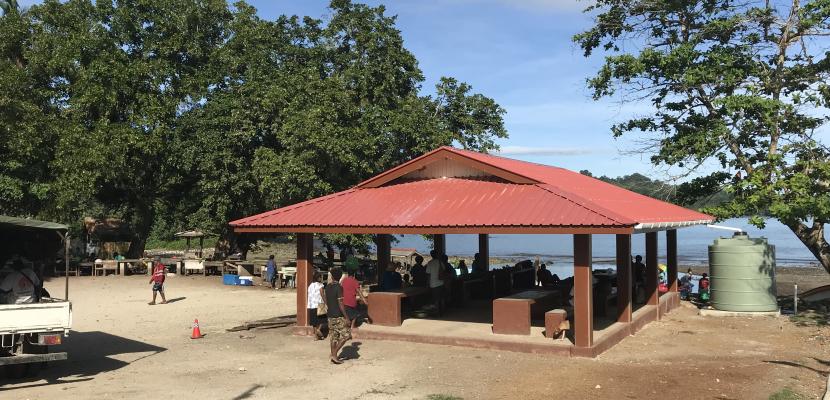
Students and academics from Bond University’s Faculty of Society & Design have completed their first major community infrastructure project in the remote Solomon Islands township of Kirakira - a marketplace for buying and selling local produce.
The three-year project has seen the marketplace transform from a rudimentary meeting place into a multi-use covered space that has become the primary economic and cultural centre of the community, where tribal villagers can gather to sell fresh fruit, vegetables, fish and bread.
Part of a broader town master plan developed by Bond University in partnership with the Makira-Ulawa Provincial Government, the new Kirakira marketplace is seen as an important project given it supports the community's farmers and traders to improve their livelihoods and grow the local economy.
The new marketplace structure also stores rainwater for drinking, provides an area for cleaning produce and fish, and has improved stormwater drainage and foreshore stabilisation.
Work on the marketplace commenced with community consultation and planning in 2015 and was funded by the Solomon Islands Government, with the project costed at $1.1 million Solomon Island Dollars (AUD $185,000).
Bond University Senior Teaching Fellow, Sustainable Environments and Planning, Ned Wales, said the marketplace was an example of students and academics working together with local authorities to improve the quality of life for the people of Kirakira.
Mr Wales said the aim of the partnership with the town was, ‘to empower Kirakira to develop as a vibrant and economically sustainable community, valuing healthy lifestyles and life-long learning while embracing the unique local culture and identity.’
“Prior to the redevelopment of the marketplace, farmers would gather around concrete tables with only umbrellas to shelter them from the elements,” he said.
“Historically, the farmers of Kirakira have been subsistence farmers, only producing enough food to feed their families or their village – there has been no real ‘market’ to speak of, and this has kept locals economically suppressed.
“Since it has opened, the marketplace has been celebrated – not just by farmers and traders, but by the local community more broadly. We’ve really been able to build trust and have been embraced by the people of Kirakira.
“The marketplace has become a hub of free market economics and is the main way the local community can improve their livelihoods.
“We are hearing feedback from the community that farmers and traders are now becoming more organised, and I would suspect this will lead to more marketplaces being built in time.”
The township of Kirakira is located in the north of Makira Island and is the Provincial Capital of the Makira-Ulawa Province, with more than 1,000 people calling it home.
Mr Wales said Bond’s Society & Design students had benefited equally from their experiences working with the people of Kirakira.
“These experiences have really opened the eyes of our young people to the way other cultures live – particularly those in developing parts of the world that are not as advantaged as Australia,” he said.
“Many students who study at Bond have grown up in a society that is far removed from the realities and difficulties faced by the people of Kirakira.
“For the students, it’s an experience carried forward in their lives - something that is ongoing long after they have returned to Australia.
“You can see how positively transformed students are by the time they get back from Kirakira – even one semester can make a difference to them.”
Bond University’s Faculty of Society & Design became involved in Kirakira in 2015, following the University’s Faculty of Health Sciences & Medicine’s success in securing New Colombo Plan funding from the Australian Government for the Solomon Islands Capstone Project.
About 30 students and staff from the Faculty of Society and Design have travelled to Kirakira to work alongside the community and Provincial Government on important community development initiatives identified by the local people. Previous projects have included the development of a town centre master plan, capturing aerial footage of the town using a drone to assist in town planning, improving the town’s waste management and recycling processes, and developing a re-orientation plan for the potential relocation of Kirakira’s hospital.
Bachelor of Sustainable Environments and Planning graduate Daniel Santone said the time he spent in Kirakira had been a deeply valuable experience.
“It helped me grow and develop as a person and appreciate the simple things in life,” he said.
“It really opened my eyes about how fortunate we are here in Australia, and how we have an obligation to help those who aren’t as fortunate as we are.”
The students are now planning the next project for the Makira-Ulawa Province, which will involve improvements to Pawa Provincial Secondary School, a one-hour boat ride from Kirakira.
A total of approximately 200 Bond students and 80 academics and supervisors across multiple faculties have visited Kirakira since the partnership began almost six years ago.